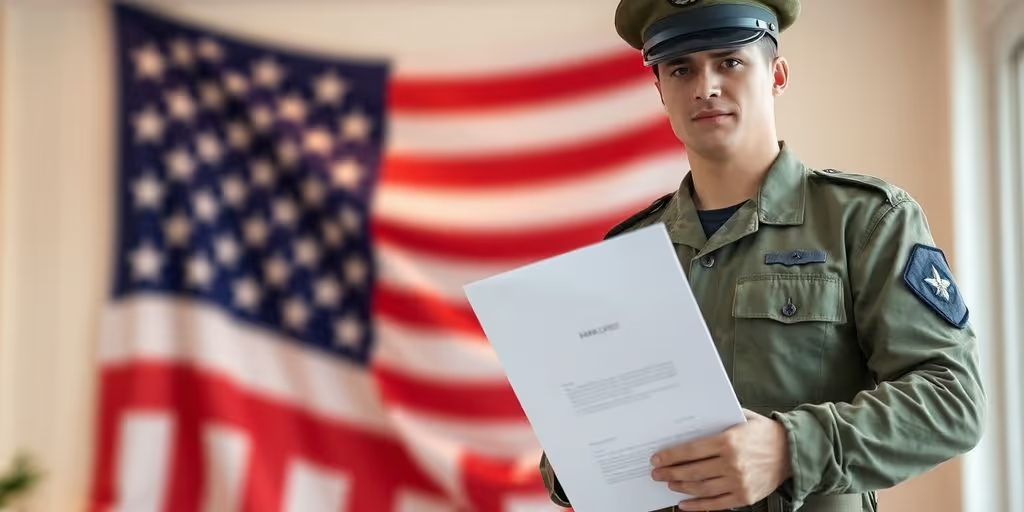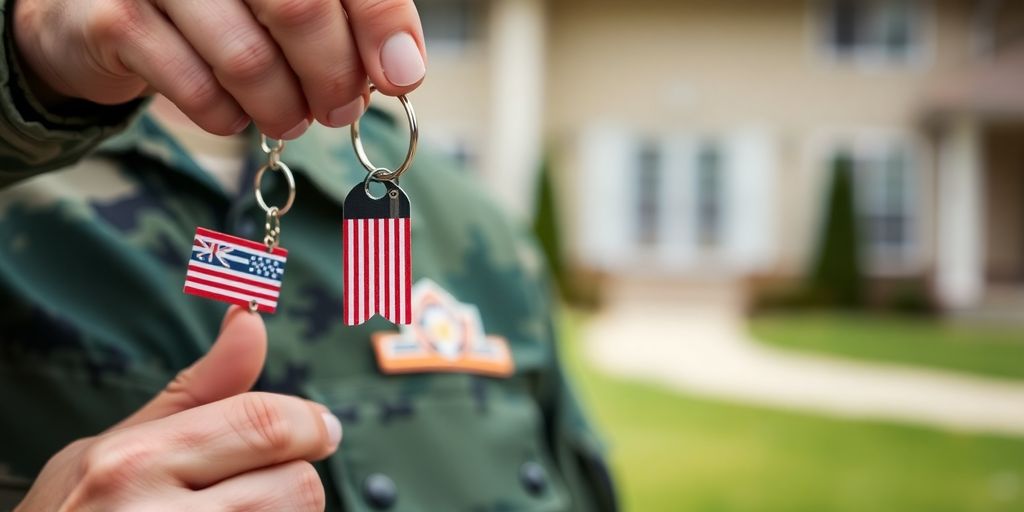Understanding Eligibility for VA Home Loan Benefits in 2025
November 19, 2025
Understand eligibility for VA home loan benefits in 2025, including service, lender, and financial requirements.

Thinking about buying a home in 2025? If you're a service member or Veteran, you might be looking into VA home loan benefits. These loans can be a real game-changer, offering some big perks that other mortgage types just don't. But, like anything official, there are rules about who gets to use them. It's super important to understand what makes you eligible for VA home loan benefits, and what lenders will expect. Let's break down everything you need to know to get ready for 2025.
Key Takeaways
- VA home loan eligibility depends on your service history and discharge status.
- Lenders have their own rules, like credit score and income checks, on top of VA requirements.
- Your VA home loan entitlement can be used more than once, which is pretty cool.
- There aren't any VA loan limits, but lenders might have their own caps.
- An assumable VA loan can make selling your home easier, especially in a market where interest rates are going up.
Understanding Basic Eligibility for VA Home Loan

Getting a VA home loan can be a fantastic benefit for eligible veterans, active-duty service members, and surviving spouses. But figuring out if you qualify can seem a little confusing at first. Let's break down the basic requirements to see where you stand.
Service Requirements for VA Home Loan Eligibility
Service requirements are the foundation of VA loan eligibility. Generally, the length of your service determines whether you meet the minimum requirements. Here's a quick rundown:
- Active Duty: Typically, you need to have served at least 90 days of active duty during wartime or 181 days during peacetime.
- National Guard/Reserves: The requirements differ slightly. You generally need to have completed at least six years of honorable service in the National Guard or Reserves, or 90 days of active service under Title 32.
- Exceptions: There are exceptions to these rules. For example, if you were discharged due to a service-connected disability, the time-in-service requirements may be waived.
Discharge Status and VA Home Loan Qualification
Your discharge status plays a big role in determining your eligibility. Generally, you must have been discharged under conditions other than dishonorable. Here's a bit more detail:
- Honorable Discharge: This is the most straightforward path to eligibility.
- General Discharge: In many cases, a general discharge will also qualify you for a VA loan.
- Other Than Honorable Discharge: This type of discharge can make it more difficult to qualify, but it's not always an automatic disqualification. The VA will review these cases individually.
- Dishonorable Discharge: A dishonorable discharge typically disqualifies you from receiving VA benefits, including home loan eligibility.
It's always a good idea to double-check your discharge paperwork (DD214) and, if you're unsure, contact the VA or a VA lender to discuss your specific situation.
Certificate of Eligibility for VA Home Loan
A Certificate of Eligibility (COE) is the document that confirms to lenders that you meet the VA's basic service requirements. Getting a COE is a critical step in the VA loan process. Here's how you can obtain one:
- Online: The quickest way is often through the VA's eBenefits portal.
- Through a Lender: Most VA lenders can obtain a COE for you.
- By Mail: You can also apply by mail, but this method takes longer. You'll need to complete VA Form 26-1880 and submit it with your discharge paperwork.
The COE will show your entitlement code, which lenders use to determine the amount of your available VA loan benefit. It's a super important piece of the puzzle!
Navigating Lender-Specific Requirements for VA Home Loan
While the VA sets the baseline for loan eligibility, remember that private lenders actually fund the loans. This means they often have their own, stricter requirements you'll need to meet. Think of it as the VA setting the rules of the game, and the lenders deciding who gets to play. It's important to understand these lender-specific criteria to increase your chances of approval.
Credit Score Expectations for VA Home Loan
The VA itself doesn't have a minimum credit score requirement, which is great! However, lenders almost always do. This is one of the most important lender-specific requirements to be aware of. You'll find that most lenders want to see a FICO score of at least 620, but this can vary. Some might go lower, and some might want something higher. It's a good idea to shop around and see what different lenders are looking for.
Income and Debt-to-Income Ratios for VA Home Loan
Lenders will want to make sure you have enough stable income to comfortably repay the loan. They'll look at your income history, job stability, and any other sources of income you have. They'll also pay close attention to your debt-to-income (DTI) ratio, which is the percentage of your gross monthly income that goes towards paying your debts. A lower DTI is generally better, as it shows you have more money available each month.
Here's a general idea of what lenders look for:
- Stable employment history
- Consistent income
- Reasonable DTI (typically below 41%)
Additional Lender Overlays for VA Home Loan
Lender overlays are extra requirements that lenders add on top of the VA's guidelines. These can include things like:
- Higher credit score requirements
- Lower DTI limits
- Restrictions on certain property types
It's really important to ask lenders about any overlays they have upfront. Don't be afraid to shop around and find a lender whose requirements you can comfortably meet. Getting pre-approved with a few different lenders can give you a good sense of what's out there and what you qualify for.
Exploring VA Home Loan Entitlement and Usage

Lifetime Benefit of VA Home Loan Entitlement
VA home loan entitlement is not a one-time deal. It's a benefit that eligible veterans can use throughout their lives. You aren't restricted to just one VA loan ever. The key is understanding how your entitlement works and how it affects your borrowing power. Think of it as a resource you can tap into multiple times, provided you meet the requirements each time you apply. It's good to know that there's no limit to the number of VA Loans you can take out during your lifetime, as long as you meet the eligibility requirements and can qualify with a lender.
Understanding Full Entitlement for VA Home Loan
Full entitlement means you have the maximum borrowing power available through the VA loan program. This is a big deal because it can eliminate the need for a down payment, especially with rising home prices.
Borrowers with full entitlement often find themselves in a stronger position when buying a home, as they can finance the entire purchase price without needing to put money down upfront. This can make homeownership more accessible.
Using Entitlement for Multiple VA Home Loans
It's possible to have more than one VA loan at a time, but it requires careful planning. Here's what you need to consider:
- Remaining Entitlement: When you use a portion of your entitlement, the amount you have left determines how much you can borrow on subsequent loans.
- Debt-to-Income Ratio: Lenders will scrutinize your debt-to-income ratio to ensure you can handle multiple mortgage payments.
- Property Type: The VA has rules about the types of properties you can finance simultaneously. Generally, you must intend to occupy the home as your primary residence.
Having multiple VA loans can be a useful strategy, but it's important to understand the implications and ensure you're financially prepared. You can use your entitlement for multiple VA Home Loans at once.
Key Financial Aspects of VA Home Loan Benefits
VA Home Loan Funding Fee Explained
The VA funding fee is a one-time payment that most Veterans need to pay when getting a VA loan. This fee helps keep the VA loan program running without needing taxpayer money. The amount you pay depends on a few things, like whether it's your first time using the VA loan benefits and how big your down payment is. You can pay it upfront or include it in your loan amount. It's worth noting that the funding fee rates are standardized across all military branches now, ensuring everyone pays the same.
Exemptions from the VA Home Loan Funding Fee
Not everyone has to pay the VA funding fee. You're usually exempt if you're a Veteran with at least a 10% disability rating from the VA or if you're a Purple Heart recipient still on active duty. These exemptions can save you a significant amount of money. It's a good idea to check if you qualify, as it can make a big difference in the overall cost of your loan.
No Maximum Loan Limits for VA Home Loan
One of the best things about VA loans is that there aren't any official loan limits anymore, at least not for those with full entitlement. This means you can borrow as much as you need to buy a home, without worrying about hitting a ceiling. Of course, you still need to qualify for the loan based on your income and credit, and lenders might have their own internal limits. But the VA itself isn't capping how much you can borrow. This change gives Veterans more buying power, especially in areas where home prices are high.
The removal of maximum loan limits has been a game-changer for many Veterans. It allows them to compete more effectively in the housing market and purchase homes that better suit their needs, without being restricted by arbitrary loan amounts.
Advantages of an Assumable VA Home Loan
Benefits for Sellers with an Assumable VA Home Loan
For sellers, having an assumable VA home loan can be a major advantage, especially when interest rates are on the rise. It makes your property more attractive to potential buyers. Since very few conventional loans are assumable, this feature can really make your listing stand out from the crowd. Basically, it lets a buyer take over your existing mortgage, keeping the same interest rate, repayment period, and balance. This is a big deal when new loans come with higher rates.
Buyer Qualifications for Assuming a VA Home Loan
Now, even though it's called
Special Considerations for VA Home Loan Eligibility
VA home loans are a fantastic benefit, but some situations require extra attention. Let's look at eligibility for surviving spouses, National Guard and Reservists, and those with disabilities.
Eligibility for Surviving Spouses for VA Home Loan
Surviving spouses of veterans who died during service or from a service-connected disability may be eligible for a VA home loan. The VA offers this benefit to help these individuals secure housing. Eligibility usually depends on factors like whether the spouse remarried (and if so, whether that remarriage ended), and the veteran's service record. It's worth checking the specific requirements, as they can be a huge help.
- The veteran's death certificate.
- Marriage certificate.
- DD214 or other separation documents for the veteran.
It's important to gather all necessary documentation to prove eligibility. The process can sometimes be complex, but the benefits are significant.
National Guard and Reservist Eligibility for VA Home Loan
National Guard and Reservists can absolutely be eligible for VA home loans. The requirements are a bit different than for active-duty personnel, but definitely achievable. Generally, it involves completing at least 90 days of active service or serving six years in the National Guard or Reserves. If you're in this category, it's a good idea to check the current service requirements to see if you qualify.
- Active duty for training purposes counts towards eligibility.
- Certain medical conditions resulting in discharge may also qualify.
- Documentation is key to proving eligibility.
Disability and Purple Heart Recipient Benefits for VA Home Loan
Veterans with disabilities and Purple Heart recipients often receive additional benefits when it comes to VA home loans. One of the biggest perks is the exemption from the VA funding fee. This fee can be a significant expense, so avoiding it can save a lot of money. Also, having a service-connected disability can sometimes make it easier to qualify for a loan, as lenders may be more lenient with certain requirements.
- Exemption from the VA funding fee.
- Potential for more lenient lending requirements.
- Access to additional resources and support.
Conclusion
So, that's the rundown on VA home loan benefits for 2025. It's pretty clear these loans are a big deal for service members and veterans, offering some real advantages when it comes to buying a home. Things like no down payment and those lower interest rates can make a huge difference. Just remember, knowing the rules and what you're eligible for is key. If you're thinking about getting one, it's smart to talk to a lender who knows their stuff about VA loans. They can help you figure out all the details and get you on the right track to owning your own place.
Frequently Asked Questions
Who can get a VA home loan?
To get a VA home loan, you usually need to have served in the military for a certain amount of time, or be a member of the National Guard or Reserves. There are also rules about how you were discharged from service. You'll need a special document called a Certificate of Eligibility (COE) to prove you can get the loan.
Can I still get a VA loan if my service was short or I was discharged for a special reason?
Even if you don't meet the usual service rules, you might still qualify. This can happen if you were discharged for certain reasons, like a medical issue from your service, or if you were let go early by the government. It's best to talk to a VA loan expert to see if you qualify.
Can I use my VA home loan benefit more than once?
Yes, you can use your VA home loan benefit more than once! There's no limit to how many times you can get a VA loan, as long as you meet the rules each time. You have a certain amount of 'entitlement' that the VA guarantees, and you can use it for one loan or even multiple loans at the same time.
Do I need a good credit score to get a VA home loan?
While the VA doesn't set a minimum credit score, most lenders who give out VA loans do. Often, they look for a credit score around 620. Lenders also check your income and how much debt you have to make sure you can afford the loan.
What is the VA funding fee and do I have to pay it?
The VA funding fee is a one-time charge that helps keep the VA loan program running. It's usually a small percentage of the loan amount. You might not have to pay it if you have a disability rating from the VA or if you've received a Purple Heart. The fee amount can change based on if it's your first VA loan, how much you put down, and other things.
What's an assumable VA home loan and how does it help sellers?
An assumable VA loan means a new buyer can take over your existing VA mortgage, including your interest rate and payment plan. This can be a big plus for sellers, especially when interest rates are going up, because it makes your home more attractive to buyers. The buyer might need to meet certain requirements and get approval from the lender, especially for loans made after 1988.

Alex Chen

Alex Chen













Get in touch with a loan officer
Our dedicated loan officers are here to guide you through every step of the home buying process, ensuring you find the perfect mortgage solution tailored to your needs.
Options
Exercising Options
Selling
Quarterly estimates
Loans
New home

Stay always updated on insightful articles and guides.
Every Monday, you'll get an article or a guide that will help you be more present, focused and productive in your work and personal life.









.png)
.png)
.png)
.avif)
.avif)
.avif)
.png)
.png)
.png)
.avif)
.png)
.png)
.avif)
.png)
.avif)
.png)
.avif)
.avif)